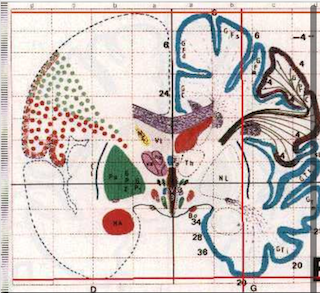Brooke Staveland

image from the Talairach & Tournoux atlas (1988)
about
I am a clinical neuroscientist with eight years of experience researching the causes and treatments of mood disorders. Most of my research fits under the umbrella of computational psychiatry, meaning I use data science tools (machine learning, Bayesian approaches, computational models) to understand individual differences in brains and behavior relevant to mental health. But in this work, I also take an interdisciplinary approach. For example, while my PhD focused on the neural circuitry underlying anxiety, I also completed a two-year specialization in clinical psychology, where I got to work hands-on with clients giving evidence-based treatments. And in my final year of my PhD, I completed an internship at RAND where I worked on translational and policy issues related to suicide prevention.
Fundamentally, I think mood disorders are caused by interlocking problems at the biological, psychological, interpersonal, societal & environmental levels. And I hypothesize that we can accelerate our ability to understand, treat, and prevent mood disorders if we bring multiple perspectives together across these levels.
research
My research career began with large-scale treatment prediction studies to better match depressed/anxious individuals with unique SSRIs and behavioral interventions at Stanford’s PanLab. In my doctoral work at UC Berkeley, I fit computational models of anxious decision-making (advised by Dr. Ming Hsu @ the Neuroecon Lab) and then use these models to better characterize the underlying brain circuitry using iEEG (advised by Dr. Robert Knight @ the Knight Lab). My research has been funded by the National Science Foundation.
check out my google scholar here
service
In addition to my research, I try to reduce the burden of mental disorders via direct service. Specifically, I volunteer with RAINN as a support specialist on RAINN’s anonymous, confidential, and text-based hotline. Support specialists help survivors in need of crisis support by being a listening ear, a soundboard for ideas that visitors want to discuss, and providing resources and information about healing from trauma.
education
Ph.D. in Neuroscience, Helen Wills Institute for Neuroscience, University of California Berkeley, Berkeley, CA, Spring 2025
Bachelor of Science in Mathematics, Summa Cum Laude, The George Washington University, Washington, DC, Spring 2017
publications
† these authors contributed equally
‡ These authors contributed equally to this work as second authors
Staveland, B.R., Oberschulte, J., Kim-McManus O., Willie, J.T., Brunner, P., Dastjerdi, M., Lin J. J., Hsu M., Knight, R. T. (2024) Circuit dynamics of approach- avoidance conflict in humans. Preprint – bioRxiv. https://doi.org/10.1101/2024.12.31.630927
Staveland, B.R†, Marciano, D.†, Lin J., Saez I., Hsu M., Knight, R. T. (2023) Electrophysiological signatures of inequity-dependent reward encoding in the human OFC. Cell Reports. https://doi.org/10.1016/j.celrep.2023.112865
Staveland, B.R†, Tozzi, L.†, Holt-Gosselin, B.†, Chesnut, M., Chang, S., Choi, D., Shiner, M., Wu, H., Sporns, O., Barch, D., Gotlib, I., Hastie, T., Kerr, A., Poldrack, R., Wandell, B., Wintermark, M., Williams, L.M. (2020) The human connectome project for disordered emotional states: project for disordered emotional states: protocol and rationale for a research domain criteria study of brain. Neuroimage. https://doi.org/10.1016/j.neuroimage.2020.116715
Goldstein-Piekarski, A.N.†, Ball, T.M.†, Samara, Z.‡, Staveland, B.R.‡, Fleming, S.L.‡, Keller, A.S. ‡, Grisanzio, K.A.‡, Holt-Gosselin, B.‡, Ma, J., Williams, L.M. (2021) Deriving biotypes for depression and anxiety using clinic- ready brain circuit metrics. Biological Psychiatry. https://doi.org/10.1016/j.biopsych.2021.06.024
Llorens A.†, Tzovara, A.†, Bellier, L. Bhaya-Grossman, I., Bidet-Caulet, A., Chang, W.K., Cross, Z.R., Dominguez-Faus, R., Flinker, A., Fonken, Y., Gorenstein, M., Holdgraf, C., Hoy, C.W., Ivanova, M.V., Jimenez, R.T, Jun, Slama, K., Staveland, B.R., Bassett, D.S., S., Kam, J. W. K., Kidd, C., Marcelle, E., Marciano, D., Martin, S., Myers, N.E., Ojala, K., Pinheiro-Chagas, P., Ries, S., Perry, A., Saez, I., Skelin, I., Buffalo, E.A., Fairhall, A.L., Kastner, S., Kopell, N.J., Lin, J.J., Nobre, A.C., Solbakk, A.K., Wallis, J.D., Wang, X.J., Yuval-Greenberg, S., Knight, R.T., Dronkers, N.F. (2021) Gender bias in academia: a lifetime problem that needs solutions. Neuron. https://doi.org/10.1016/j.neuron.2021.06.002
Keller, A.S., Leikauf J.E., Holt-Gosselin B, Staveland B.R., Williams L.M. (2019) Paying attention to attention in depression. Translational Psychiatry. https://doi.org/10.1038/s41398-019-0616-1
Goldstein-Piekarski, A.N., Staveland, B.R., Ball, T.M., Yesavage, J., Korgaonkar, M.S., Williams, L.M. (2018). Intrinsic functional connectivity predicts remission on antidepressants: A randomized controlled trial to identify clinically applicable imaging biomarkers. Translational Psychiatry. https://doi.org/10.1038/s41398-018-0100-3